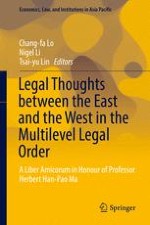2016 | OriginalPaper | Buchkapitel
22. Coordinating Matrimonial Property Regimes Across National Borders: Israeli and Comparative Perspectives
verfasst von : Talia Einhorn
Erschienen in: Legal Thoughts between the East and the West in the Multilevel Legal Order
Verlag: Springer Singapore
Aktivieren Sie unsere intelligente Suche, um passende Fachinhalte oder Patente zu finden.
Wählen Sie Textabschnitte aus um mit Künstlicher Intelligenz passenden Patente zu finden. powered by
Markieren Sie Textabschnitte, um KI-gestützt weitere passende Inhalte zu finden. powered by
